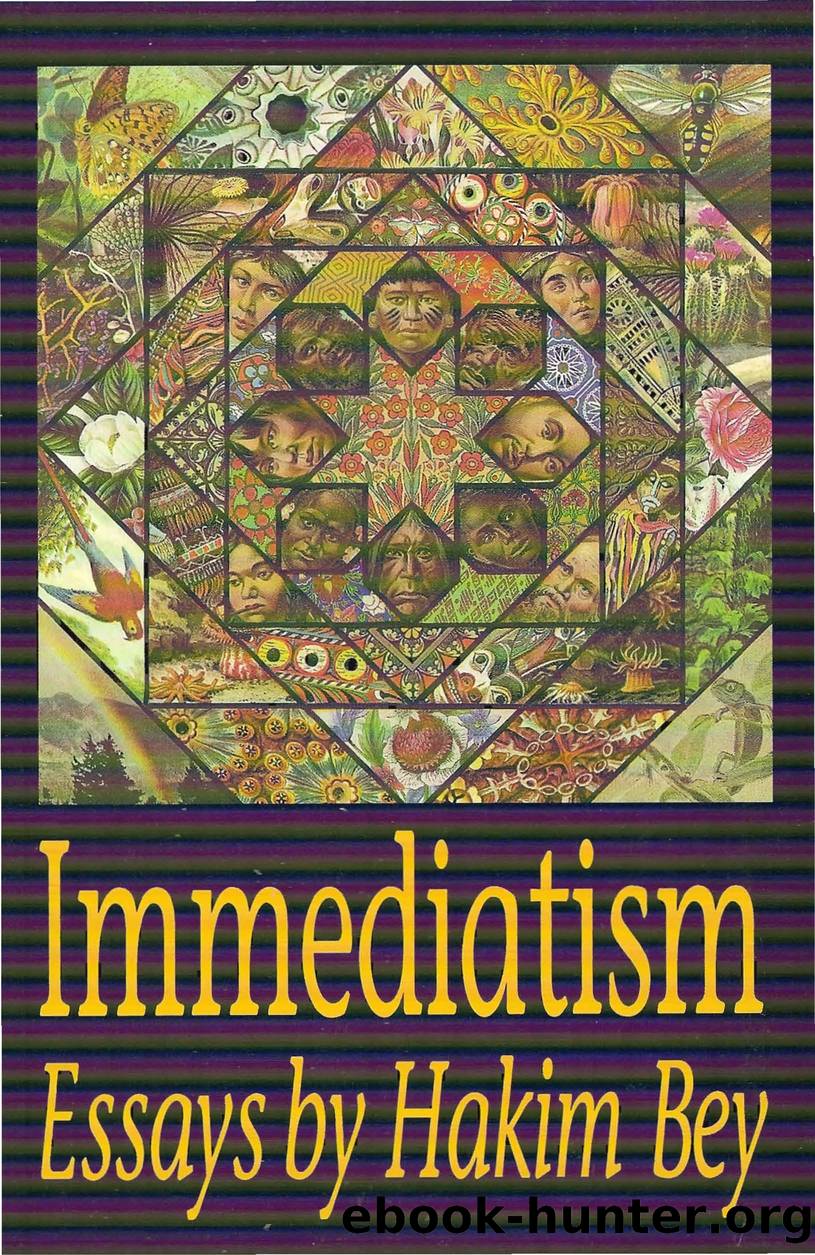Immediatism by Hakim Bey

Author:Hakim Bey
Language: eng
Format: epub
Tags: Peter Lamborn Wilson, ontology, taz
Published: 1994-08-14T16:00:00+00:00
Imagination
There is a time for the theatre.âIf peopleâs imagination grows weak there arises in it the inclination to have its legends presented to it on the stage: it can now endure these crude substitutes for imagination. But those ages to which the epic rhapsodist belongs, the theatre and the actor disguised as a hero is a hindrance to imagination rather than a means of giving it wings: too close, too definite, too heavy, too little in it of dream and bird-flight.
â Nietzsche
But of course the rhapsodist, who here appears only one step removed from the shaman (ââ¦dream and bird-flightâ) must also be called a kind of medium or bridge standing between âa peopleâ and its imagination. (Note: weâll use the word âimaginationâ sometimes in Wm. Blakeâs sense & sometimes in Gaston Bachelardâs sense without opting for either a âspiritualâ or an âaestheticâ determination, & without recourse to metaphysics.) A bridge carries across (âtranslate,â âmetaphorâ) but is not the original. And to translate is to betray. Even the rhapsodist provides a little poison for the imagination.
Ethnography, however, allows us to assert the possibility of societies where shamans are not specialists of the imagination, but where everyone is a special sort of shaman. In these societies, all members (except the psychically handicapped) act as shamans & bards for themselves as well as for their people. For example: certain Amerindian tribes of the Great Plains developed the most complex of all hunter/gatherer societies quite late in their history (perhaps partly in thanks to the gun & horse, technologies adopted from European culture). Each person acquired complete identity & full membership in âthe Peopleâ only thru the Vision Quest, & its artistic enactment for the tribe. Thus each person became an âepic rhapsodistâ in sharing this individuality with the collectivity.
The Pygmies, among the most âprimitiveâ cultures, neither produce nor consume their music, but become en masse âthe Voice of the Forest.â At the other end of the scale, among complex agricultural societies, like Bali on the verge of the 20th century, âeveryone is an artistâ (& in 1980 a Javanese mystic told me, âEveryone must be an artist!â).
The goals of Immediatism lie somewhere along the trajectory described roughly by these three points (Pygmies, Plains Indians, Balinese), which have all been linked to the anthropological concept of âdemocratic shamanism.â Creative acts, themselves the outer results of the inwardness of imagination, are not mediated & alienated (in the sense weâve been using those terms) when they are carried out BY everyone FOR everyoneâwhen they are produced but not reproducedâwhen they are shared but not fetishezed. Of course these acts are achieved thru mediation of some sort & to some extent, as are all actsâbut they have not yet become forces of extreme alienation between some Expert/Priest/Producer on the one hand & some hapless âlaypersonâ or consumer on the other.
Different media therefore exhibit different degrees of mediationâ& perhaps they can even be ranked on that basis. Here everything depends on reciprocity, on a more-or-less equal exchange of what may be called âquanta of imagination.
Download
This site does not store any files on its server. We only index and link to content provided by other sites. Please contact the content providers to delete copyright contents if any and email us, we'll remove relevant links or contents immediately.
| Africa | Americas |
| Arctic & Antarctica | Asia |
| Australia & Oceania | Europe |
| Middle East | Russia |
| United States | World |
| Ancient Civilizations | Military |
| Historical Study & Educational Resources |
The Bomber Mafia by Malcolm Gladwell(1184)
Submerged Prehistory by Benjamin Jonathan; & Clive Bonsall & Catriona Pickard & Anders Fischer(1162)
Facing the Mountain by Daniel James Brown(1136)
The Dawn of Everything by David Graeber & David Wengrow(1112)
The Way of Fire and Ice: The Living Tradition of Norse Paganism by Ryan Smith(1033)
Wandering in Strange Lands by Morgan Jerkins(1019)
Tip Top by Bill James(1004)
Driving While Brown: Sheriff Joe Arpaio Versus the Latino Resistance by Terry Greene Sterling & Jude Joffe-Block(1003)
Evil Geniuses: The Unmaking of America: A Recent History by Kurt Andersen(1001)
Red Roulette : An Insider's Story of Wealth, Power, Corruption, and Vengeance in Today's China (9781982156176) by Shum Desmond(1000)
F*cking History by The Captain(969)
It Was All a Lie by Stuart Stevens;(943)
White House Inc. by Dan Alexander(908)
Evil Geniuses by Kurt Andersen(903)
Treasure Islands: Tax Havens and the Men who Stole the World by Nicholas Shaxson(881)
American Dreams by Unknown(860)
American Kompromat by Craig Unger(850)
The Fifteen Biggest Lies about the Economy: And Everything Else the Right Doesn't Want You to Know about Taxes, Jobs, and Corporate America by Joshua Holland(817)
The First Conspiracy by Brad Meltzer & Josh Mensch(813)
